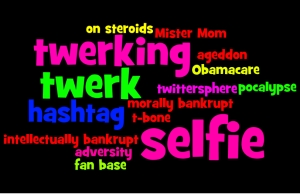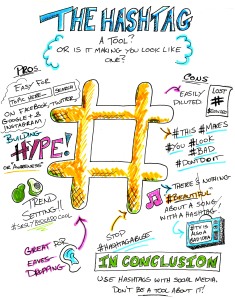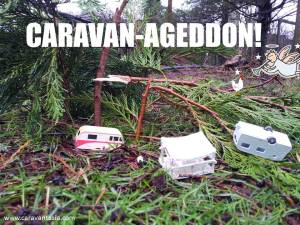To kick off our series on words, we caught up with Tom Pink at Lake Superior State University (LSSU). Our readers might remember his commentary last year on LSSU’s 2012 Banished Words List. The latest installment of the annual list published every New Year’s Day features a smattering of old favorites – or rather, least favorites – like “Mr. Mom” and “hashtag” among them. There’s a new self-centered word joining them: the omnipresent “selfie.” Read on for the full scoop about how we’ve focused the camera not just on ourselves, but on a few new least-favorite words.

Credit: #SELFIE (Official Musica Video) – The Chainsmokers
– – –
The word that received the most nominations this year (2013) was “selfie.” Ironically, the Oxford Dictionary also named this word their “Word of the Year.” Why do you think “selfie” took the top spot on your list compared to the other words and phrases?
Ha! We look forward to the Oxford list every year because invariably their “Word of the Year” will end up being one of ours, too. “Selfie” received the top spot this year in part because it received the most nominations. As is often the case with our nominations, people said they objected to the act itself as well as the word. The many celebrities and politicians who published “selfies” over the past year certainly helped propel this word to the top of our list.

Credit: bellenews.com
How does the selection committee decide which nominated words are worthy of making the list?
We look at a few things when we’re considering words and phrases to banish. While the number of nominations certainly helps push a word to the list, it’s not the only way it makes it, and it doesn’t guarantee inclusion. We give serious consideration to the words and phrases that receive the most nominations, but we also try to keep with intentions of the list’s creator, Bill Rabe, who had a great sense of humor and liked to keep the list light-hearted. If we read a nomination and it makes everyone on the committee laugh, there’s a good chance it will at least go into the “maybe” pile.
Do students and staff at LSSU get into the fun each year? Is there excitement on campus leading up to the announcement of banished words list?
In recent years, probably due to increased presence in social media and internet web sites, there is a bit more excitement on campus about the list. However, the list is usually pulled together during the week between Christmas and New Year’s Day, when the semester is over and the campus is closed. Because of that, it’s often difficult for us to get many students and faculty involved in the selection. We do get a fair number of students and employees who submit nominations, though.

Credit: LSSU.edu
What has been your favorite banished word during the 40 years that LSSU has created this list?
That’s a tough one. Some of them stick in my head because they are used so often. A good example is the redundant “safe haven.” That was banished in 1993 but is still widely used in news reports. Some of my favorites are words and phrases that didn’t make the list. For example, I remember one year someone made me chuckle when he nominated “legally drunk” in reference, of course, to exceeding the legal limit of alcohol allowed in one’s blood when he or she is operating an automobile. It’s a weird phrase on its own. The nominator said that if we extend the logic, then there must be occasions when someone is “illegally sober.” I still smile at that one, but we didn’t include it on the list because it was too close to “alcohol-related drunk driving,” which we had included on the list in 1989.
Last year you mentioned that the majority of nominations were received through email or your web page. Have you seen an increased response across your social media platforms? If so what do you attribute to this increase?
We have definitely seen an increased response through social media. We would probably attribute that to the fact that more and more people are getting their “news” through those sorts of outlets, and more and more people are using their mobile devices to get their news and to access the internet. Stories fly around the internet so much faster than Bill Rabe ever could have imagined when he devised this list. The news is shared in ways that he couldn’t have imagined, either. Because of that, social media is figuring more and more into the way we publicize the list and into the way we solicit nominations…..Just as news travels faster these days, the news cycle is shorter, too. In the 1990s, we spent three-to-four weeks booking radio and newspaper interviews, especially radio. Talk show hosts loved the list. They still do. But we do fewer hour-long, call-in talk shows than we used to do back then. Most interviews, whether live or recorded, are 5-15 minutes. The intense period of interviews after the list is published, that used to be spread out over a few weeks, is now shortened to a week or less.

Credit: socialated.com
“Hashtag” made the list this year and many nominations used hashtags in their response. Do you think this a word that the social media savvy love to hate? Is it a necessary evil?
It certainly may be. We think that hashtags serve a purpose on blogs and social media when people are sharing information. However, when the word began showing up in conversations as a supposed cute way of drawing attention to the point a person was trying to make, nominators told us that they soon became sick of it.
Following your ban of “-ageddon” and “-pocolypse” do you expect to see more prefixes and suffixes making their way onto the list in addition to stand alone words and phrases?
We often get nominations for prefixes and suffixes and usually we don’t include them unless there is a strong case to do so. There have been some notable exceptions, such as the “-gate” suffix used so often in politics. This year, with so many people feeling the effects of extreme weather and so many news reports including those suffixes, we included those two. We’ll see what the future brings.

Credit: caravantasia.com
The list also banishes words that are misused. What do you think was the most misused word this year and why do you think people seem to have a tough time using it correctly?
I guess my favorite this year for “mis-use” is ‘T-bone’ when used to describe a traffic accident. I understand people using that word in casual conversation, but when news anchors on radio and TV started using it in their reports, that’s just ridiculous.
What is your favorite word or phrase that has been banished this year and why?
My favorite this year would have to be “Mr. Mom.” We were surprised when it kept showing up in the nominations 30 years after the Michael Keaton movie made it famous. I like how those who nominated it feel so passionate about their reasons for wanting it banished, and I like how it makes people stand back and say, “Huh?” I also appreciate how its newly found disfavor is a reflection on the changes we’ve seen in our society. These days, you don’t know who’s staying home with the kids – it could be “Mr. Mom,” or “Mrs. Dad.”

Credit: Mr. Mom (1983)
Are you already receiving nominations for words to be added to next year’s list of banished words? Any guesses as to what words and phrases may appear on the 2014 list?
Oh, yes. We probably get most of our nominations in January and December when the list is on people’s minds more than it is during summer vacation. It’s difficult to say what may make the list in 2015. We see TBT (Throwback Thursday) and Polar Vortex among the nominations, but it’s difficult to say if they will “stick” later this year. “Curate” is another that has been showing up in recent years. That may be a front-runner for 2015.
Next year the List of Words to be Banished from the Queen’s English for Misuse, Overuse and General usefulness turns 40. Is anything planned to celebrate the list on its big anniversary?
No definite plans, but again, one never knows what will happen between now and New Year’s Eve.
– – –
If you’d like to keep up with LSSU or send in your own nomination, visit www.lssu.edu/banished or email banish@lssu.edu. Many thanks to Tom Pink for his insights the past two years! We’re curious: do our readers have any words in mind that ought to be banished?
Julia Smith, Project Assistant
Collaborative Services, Inc.

Recent Comments